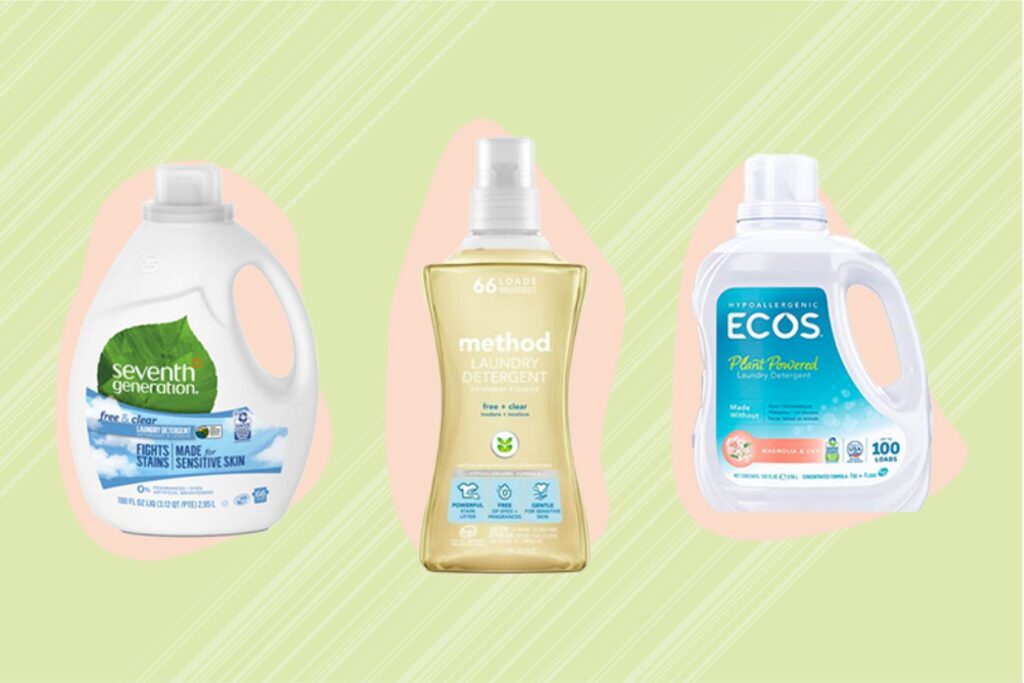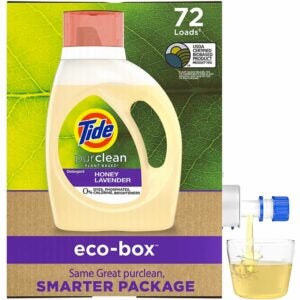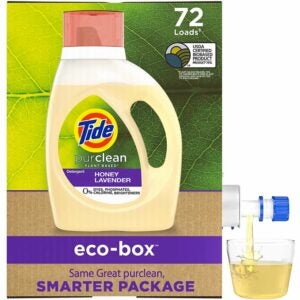If you’re a proud owner of a septic tank, you might find yourself pondering over the compatibility of your trusty powder laundry detergent. Well, wonder no more! In this article, we’ll explore the fascinating world of septic tanks and discuss whether or not using powder laundry detergent is a safe choice. So, sit back, relax, and let’s dive into this captivating topic!

The Basics of Septic Tanks
What is a septic tank?
A septic tank is an underground system used for wastewater treatment in homes and other buildings that are not connected to a centralized sewer system. It is a crucial part of the plumbing system, responsible for storing and decomposing solid waste and separating it from the liquid effluent. Septic tanks are typically made of durable materials such as concrete or fiberglass and are designed to be watertight and durable.
How does a septic tank work?
The working principle of a septic tank involves a series of natural processes that help break down and treat the waste materials. When wastewater enters the septic tank, it undergoes a process of separation. The solid waste settles at the bottom of the tank, forming a layer called sludge, while the lighter particles, grease, and oils float to the top, forming a layer known as scum. The remaining liquid, referred to as effluent, remains in the middle layer.
As more wastewater enters the tank, the liquid effluent flows out of the septic tank and into the drain field or leach field, where it is further treated and distributed into the surrounding soil. The soil acts as a natural filter, removing harmful bacteria and other contaminants from the effluent.
Why is it important to care for a septic tank?
Caring for a septic tank is crucial to ensure its proper functioning and longevity. Neglecting septic tank maintenance can lead to various issues, such as clogged pipes, sewage backups, foul odors, and even groundwater contamination. Regular maintenance and proper usage can help prevent these problems and extend the lifespan of your septic system.
By understanding the basics of septic tank care and taking simple precautions, you can avoid expensive repairs, protect the environment, and maintain a healthy living environment for you and your family.
Types of Laundry Detergents
Liquid laundry detergent
Liquid laundry detergent is one of the most commonly used detergents for washing clothes. It comes in liquid form and is usually poured directly into the washing machine. Liquid detergents are known for their effectiveness in removing stains and dirt, and they often include additives such as enzymes, surfactants, and brighteners to enhance their cleaning power. They are generally easy to use and dissolve quickly in water.
Powder laundry detergent
Powder laundry detergent, as the name suggests, comes in powdered form and is measured out using a scoop or spoon before being added to the washing machine. Powder detergents are known for their ability to tackle tough stains and provide a deep clean. They often contain active ingredients such as enzymes and bleaching agents to break down and remove dirt and grime from fabrics.
Pods or single-use packs
Pods or single-use packs have gained popularity in recent years. These small, pre-measured packets contain a concentrated dose of detergent, complete with all the necessary ingredients for a proper clean. Pods are convenient to use since there’s no measuring required, and they eliminate the risk of spilling or wasting detergent. However, it’s important to note that not all pods are septic tank compatible, so it’s crucial to choose the right ones for your specific needs.

Understanding the Impact of Detergents on Septic Tanks
Chemical composition of powder laundry detergent
Powder laundry detergents often contain a combination of surfactants, builders, enzymes, bleaching agents, and fragrances. Surfactants, also known as surface-active agents, help remove dirt and stains by reducing the surface tension of water. Builders, such as phosphates or zeolites, enhance the cleaning effectiveness of the detergent by softening water and improving its ability to remove dirt particles.
Enzymes, including protease, amylase, and lipase, are added to break down proteins, starches, and fats, respectively. These enzymes help remove tough stains and improve the overall cleaning power of the detergent. Bleaching agents, such as sodium percarbonate or sodium perborate, provide whitening and brightening effects by oxidizing stains and removing color.
Fragrances, on the other hand, are added to provide a pleasant scent to freshly washed clothes. However, certain fragrances may contain chemicals that can be harmful to the environment and septic system if not properly formulated.
Effects of powder laundry detergent on septic tanks
Powder laundry detergents generally have a minimal impact on septic tanks when used in moderation. The surfactants and enzymes present in the detergents help break down organic matter, including solid waste, making it easier for the septic tank to decompose and treat the waste.
However, excessive use of powder laundry detergent can overload the septic tank with excessive sudsing and increase the overall solids content. This can lead to issues such as clogged pipes, reduced efficiency of the septic system, foul odors, and possible damage to the drain field. It’s important to use powder laundry detergent as directed and avoid excessive usage to maintain a healthy septic system.
Factors to Consider for Septic Tank Compatibility
Efficiency at breaking down solids
One of the key factors to consider when choosing a laundry detergent for septic tanks is its ability to break down solids. The detergent should contain enzymes that effectively break down proteins, starches, and fats, as these substances make up a significant portion of solid waste in the septic tank. Look for detergents labeled as “septic-safe” or those specifically designed for use with septic systems.
Harsh chemicals and additives
Certain chemicals and additives commonly found in laundry detergents can harm the beneficial bacteria in the septic tank, disrupting the natural decomposition process. Avoid detergents that contain chlorine bleach, phosphates, and other harsh chemicals that can kill off the beneficial bacteria. These bacteria play a vital role in breaking down solid waste and treating the effluent.
Amount of sudsing
Excessive sudsing can be detrimental to septic tanks as it can disrupt the natural flow and settling of solids in the tank. Look for detergents that produce less suds or those specifically labeled as low sudsing or septic-safe. Reduced sudsing detergents help prevent clogs and maintain the overall efficiency of the septic system.
Residue build-up
Some laundry detergents can leave behind residues on clothes, which can eventually find their way into the septic tank. These residues can contribute to the build-up of sludge and scum in the tank, reducing its capacity and effectiveness. Look for detergents that leave minimal residue and opt for products specifically formulated for septic tank compatibility.

Benefits of Using Powder Laundry Detergent with a Septic Tank
Cost-effectiveness
Powder laundry detergent is generally more cost-effective compared to liquid detergents or single-use pods. The powdered form allows for better concentration and easy measurement, meaning you can use the exact amount needed for each load without wasting any product. This can help save money in the long run, especially for households with a high laundry load.
Efficiency at stain removal
Powder laundry detergents are known for their powerful stain-removing capabilities. The enzymes and bleaching agents present in the powder can effectively break down and remove tough stains, ensuring your clothes come out clean and fresh. This can be especially beneficial for households with active individuals or young children who tend to get their clothes dirty more frequently.
Reduced environmental impact
Powder laundry detergents, compared to liquid ones, typically have a lower environmental impact. They require less packaging materials, resulting in reduced waste. Additionally, the powdered form allows for more concentrated formulas, meaning smaller amounts of detergent are needed per load. This can help reduce water consumption and energy usage associated with production, transportation, and disposal of the detergent.
Factors that Could Make Powder Laundry Detergent Incompatible
High levels of phosphates
Phosphates are commonly used in laundry detergents as water softeners and builders. However, high levels of phosphates can have negative effects on septic systems and the environment. Phosphates can contribute to the overgrowth of algae in bodies of water, leading to imbalanced ecosystems. When choosing a powder laundry detergent for your septic tank, opt for those labeled as phosphate-free or low-phosphate to minimize their impact.
Added enzymes
While enzymes can be beneficial for stain removal and breaking down organic matter, certain enzymes may not be suitable for septic systems. Some enzymes, such as protease, can have elevated levels of nitrogen and phosphorus, which can increase the nutrient content in the septic tank. Excessive nutrients can lead to an overgrowth of bacteria and imbalances in the tank’s ecosystem. Look for detergents with enzymes specifically formulated for septic tank use.
Bleaching agents
While bleaching agents can provide whitening effects, they can also have adverse effects on septic systems. Chlorine bleach, in particular, is known for its antimicrobial properties, which can disrupt the beneficial bacteria in the septic tank. Avoid using powder laundry detergents that contain chlorine bleach or opt for oxygen-based bleaching agents, which are less harmful to the septic system.
Fragrances and dyes
Fragrances and dyes are commonly added to laundry detergents to provide a pleasant scent and enhance the appearance of clothes. However, some fragrances and dyes may contain chemicals that can be harmful to the environment and septic system. Choose powder laundry detergents that are fragrance-free or use natural fragrances derived from essential oils. Similarly, opt for detergents without synthetic dyes to minimize their potential impact on the septic system.

Tips for Using Powder Laundry Detergent with a Septic Tank
Use a septic-safe powder laundry detergent
When purchasing powder laundry detergent for use with a septic tank, look for products specifically labeled as septic safe or designed for septic tank compatibility. These detergents are formulated to minimize their impact on the septic system while still providing effective cleaning.
Avoid excessive usage
Using more detergent than necessary can overload the septic tank with excessive sudsing and increase the solids content. Follow the manufacturer’s instructions and use the recommended amount of powder laundry detergent per load. Proper dosage ensures effective cleaning while reducing the risk of septic system issues.
Pre-treat stains before washing
For tough stains, consider pre-treating the affected areas with a stain remover or spot treatment before adding the clothes to the washing machine. This can help loosen the stain and reduce the reliance on excessive detergent. By pre-treating stains, you can maintain the efficiency of your septic tank without compromising on cleaning power.
Regular septic tank maintenance
Regardless of the type of laundry detergent you use, regular septic tank maintenance is essential for its proper functioning. Schedule regular inspections and pumping with a professional septic tank service provider. This will help remove accumulated solids and ensure the overall health of your septic system. Regular maintenance, combined with responsible detergent usage, can help maximize the lifespan of your septic system.
Alternatives to Powder Laundry Detergent for Septic Tanks
Liquid laundry detergent
Liquid laundry detergent is a suitable alternative to powder detergent for septic tanks. Similar to powder detergents, choose liquid detergents that are labeled as septic safe or designed specifically for use with septic systems. These detergents have similar cleaning power and are formulated to minimize their impact on the septic tank and the environment.
Septic-safe laundry detergents
In addition to liquid laundry detergents, there are specialized septic-safe laundry detergents available in the market. These detergents are formulated with septic systems in mind, taking into consideration factors such as biodegradability, low sudsing, and minimal impact on sewage treatment processes. Look for detergents specifically labeled as septic safe or recommended for septic tank use.
Natural and eco-friendly laundry options
For those seeking more environmentally friendly options, natural and eco-friendly laundry detergents can be a suitable choice. These detergents are often made from plant-based or biodegradable ingredients and are free from harsh chemicals and additives. Look for products that are labeled as eco-friendly or biodegradable, and ensure they are compatible with septic systems.

Conclusion
Choosing the right laundry detergent for use with a septic tank is important for maintaining a healthy septic system and minimizing environmental impact. While powder laundry detergents can be used with septic tanks, it’s crucial to consider factors such as chemical composition, efficiency at breaking down solids, and potential harm to the septic system. By selecting septic-safe powder detergents, following recommended usage guidelines, and regularly maintaining your septic tank, you can enjoy clean clothes while ensuring the longevity and efficient operation of your septic system.
